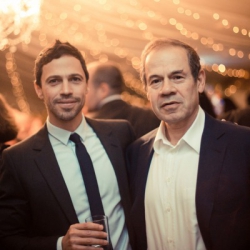
Mark and Isai Scheinberg Have Been the Key Figures at PokerStars Since 2001
Soon-to-be former PokerStars executive Mark Scheinberg is set to be the world’s next young billionaire after agreeing to sell the Oldford Group for $4.9 billion to Amaya Gaming Group Inc. Scheinberg, 40, has been a pioneer of online gambling over the course of the past 10 to 15 years.
His father, Isai Scheinberg, brought Mark into the business of online wagering. The website launched in 2001, but it quickly gained preeminence in the online poker world, thanks to excellent software and deft marketing strategies. The Scheinbergs held online World Series of Poker satellite events, then sent the winners to the World Series of Poker Main Event each year. In 2003, PokerStars sent eventual champion Chris Moneymaker. In 2004, the company sent the eventual winner, Greg “Fossilman” Raymer.
PokerStars and the Poker Boom
At the time of the Moneymaker victory, PokerStars was the second- or third-leading poker site on the Internet. Two years later, at the height of the Poker Boom, the website was the top in the market and it never looked back. Even after the UIGEA, PokerStars seemed able to walk through raindrops. Then Black Friday came, in which a U.S. federal court seized domains and began indicting gambling executives, including the top people at PokerStars and Full Tilt Poker. Isai Scheinberg still remains under indictment in the United States, which is why New Jersey and Delaware have barred PokerStars from operating licensed online casinos in their states. With the legal issues and a multi-billion dollar offer on the table, the time was right for the Scheinbergs to get out of the business.
Under terms of July’s agreement, Amaya Inc. will pay the shareholders of Rational Group, the publicly-traded portion of the Oldstone/PokerStars corporate entity, $4.5 billion when the transaction closes. If certain benchmarks are reached over the next three years, then another $400 million will be paid over the next three years.
When it’s all said and done, Mark Scheinberg will collect $3.6 bilion on the transactions. In a joint press release from Amaya and Rational, it was announced Mark Scheinberg plans to leave Rational Group when the deal is finalized.
Last Year’s Earnings
Rational Group had $420 million in adjusted earnings before taxes, interests, depreciation, and amortization on revenue of $1.1 billion in 2013. Such profits are why PokerStars remains such a popular stock, despite having significant issues in being accepted back in to the lucrative American gaming market.
Mark Scheinberg Press Release
In a separate statement to the press, Mark Scheinberg praised his employees and his father. Scheinberg’s release read, “I am incredibly proud of the business Isai and I have built over the last 14 years, creating the world’s biggest poker company and a leader in the iGaming space. Our achievements and this transaction are an affirmation of the hard work, expertise and dedication of our staff, which I am confident will continue to drive the company’s success.”
Black Friday Reviewed
In April 2011, U.S. Attorney Preet Bharara of the Southern District of New York indicted Isai Scheinberg and 10 other principals with bank fraud, money laundering, and illegal gambling. Bharara used provisions ofthe UIGEA law to make his charges, because the 2006 act bans companies from accepting payments for online bets. The indictments led to months of legal squabbles.
Finally, in 2012, PokerStars agreed to pay $731 million in fines to the U.S. government, to settle the charges without admitting wrongdoing. Betsy Feerstein, a spokeswoan for Prareet Bharara, said that Isai Scheinberg remains under indictment by the U.S. government.
PokerStars Legal Troubles
Though the elder Scheinberg remains outside of U.S. custody, his legal concerns have left a dark cloud over PokerStars’ American dealings. When Delaware, New Jersey, and Nevada legalized online gambling for licensed companies, PokerStars was barred across the board. Nevada used a “bad actor” law to ban those who accepted bets in the US after the UIGEA law was passed. New Jersey simply suspended the licensing process until PokerStars got its legal troubles behind it. California and Pennsylvania each are considering legalizing poker, but both states are considering bad actor laws which target PokerStars in particular.
David Baazov, the CEO of Amaya Inc., believes his company will be able to skirt the obstacles which have held back PokerStars. Amaya is a Canadian company, based in the Pointe-Claire suburb of Montreal, while PokerStars is based on the Isle of Man near England. Baazov said, “Amaya is licensed in many jurisdictions, over 80 worldwide. This will be worked out on a state-by-state basis.”
